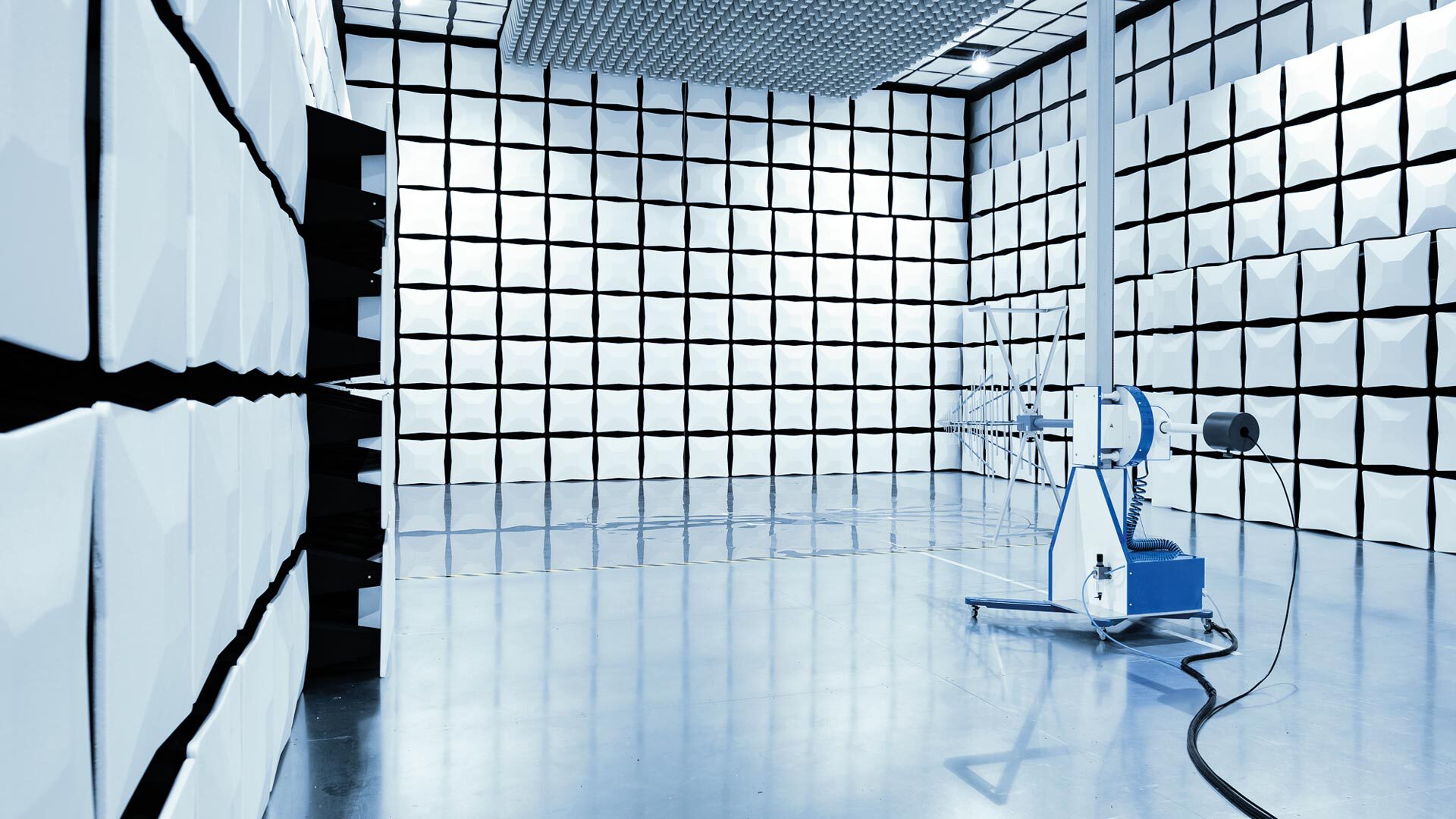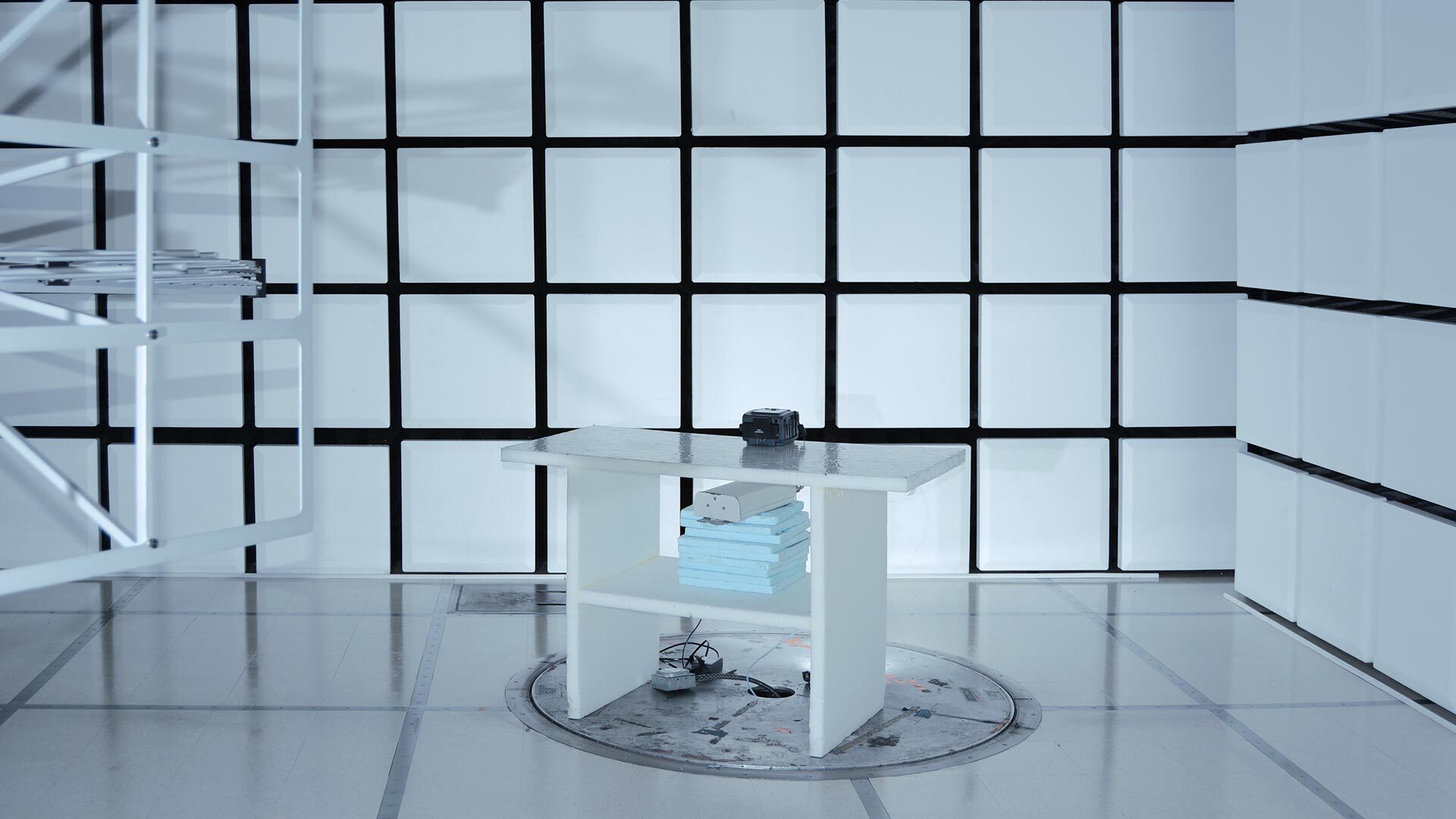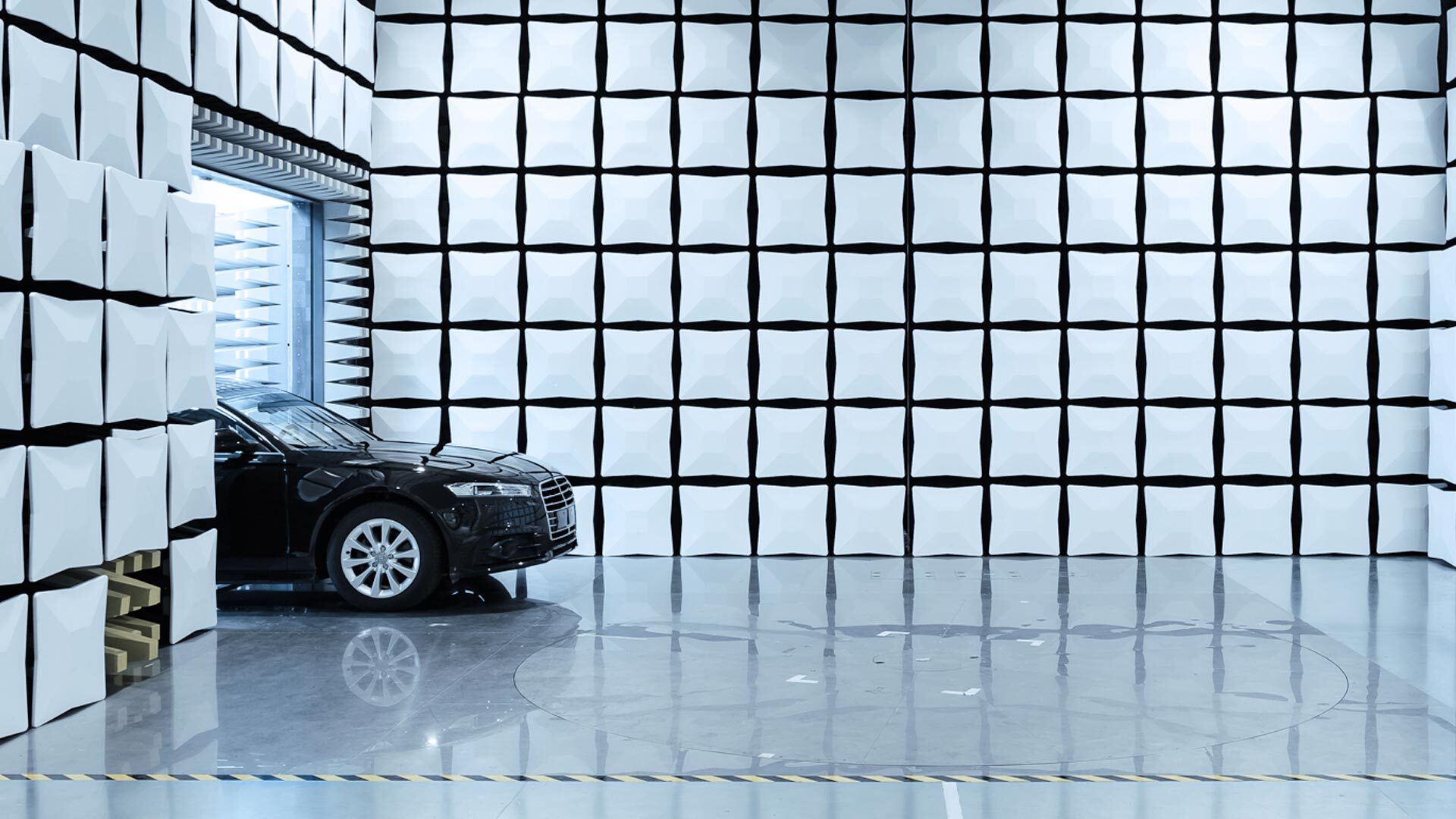
Electromagnetic compatibility (EMC) describes the ability of electronic devices and systems to tolerate electromagnetic interference in their operating environment and at the same time not generate any unwanted electromagnetic emissions themselves.
Today, this compatibility is a key prerequisite for being able to be marketed on a wide variety of markets worldwide. EMC tests can be used to ensure that an electronic device or system meets all electromagnetic compatibility requirements.
With our numerous accreditations and recognitions (including DAkkS, ZLG, KBA, SNCH, NSAI), we cover a large number of tests and are therefore your ideal partner for electromagnetic compatibility.
We test on the basis of a wide range of regulatory requirements and internationally harmonized EMC standards. These include, among others
The test reports we issue are recognized worldwide. To this end, we are in close contact with official bodies and regulatory authorities. This applies to Europe, USA (FCC), Canada (ISED) and Japan (MIC), among others.
The requirements for electromagnetic compatibility can vary considerably depending on the industry and product. This is why we are able to offer suitable EMC measurements and test procedures for a wide range of scenarios and applications. This gives our customers the certainty that every device or system tested by us meets all current EMC standards.
EMC tests for electrical devices
In the Electromagnetic Compatibility Act (EMVG), the legislator has made compliance with basic EMC requirements mandatory
on the basis of EU Directive 2014/30/EU. For manufacturers, successful EMC tests in accordance with this directive are also
a key quality feature of their products, as the use of appropriately tested devices prevents product or system failures
due to electromagnetic interference.
Essential information about EMC tests for electrical devices
EMC tests for products with radio technologies
In addition to the regulatory radio tests for products with wireless technologies, EMC tests are also required
for these products so that they can be sold and used in their target markets.
Essential information about EMC tests for products with radio technologies
EMC tests for automotive
Our diverse service portfolio for the automotive industry also includes EMC testing,
as the measurement of electromagnetic compatibility is of essential importance in the automotive sector.
Essential information about EMC tests for automotive
EMC tests for medical technology
Professional testing of electromagnetic compatibility is particularly important and mandatory for electrical devices in the medical sector.
The specifications for electromagnetic interference are particularly strict in the medical environment and the results of the EMC tests
must provide a reliable basis for eliminating the interference.
Essential information about EMC tests for medical technology
EMC tests for railroad technology
EMC tests in the field of railroad technology serve to ensure that electronic and electrical systems in rail vehicles
and in the infrastructure can be operated reliably and without interference.
Essential information about EMC tests for railroad technology
EMC testing for mechanical and plant engineering
Directive 2006/42/EC (Machinery Directive) regulates a uniform level of protection for the prevention of accidents
when placing machinery and partly completed machinery on the market. In order to ensure maximum safety
during handling, EMC tests are also prescribed for machinery, which we can carry out either
in our EMC measuring halls or as on-site tests.
Essential information about EMC testing for mechanical and plant engineering
If required, we also offer customized EMC tests. We carry out EMC performance test procedures tailored to your requirements,
which include customized EMC testing services:
Electromagnetic environmental compatibility (also known as electromagnetic compatibility with the environment, EMCE) refers to the compatibility of electromagnetic field (EMF) emissions with the environment, in particular with humans. It defines limit values to ensure safety and prevent possible damage to health.


In our EMC laboratories in Essen, Saarbrücken and Milpitas (Silicon Valley, USA), we offer a wide range of EMC tests based on various standards. Our laboratories are continuously optimized according to the latest technical requirements to ensure precise results in a professional and technologically advanced environment.
EMC testing primarily involves testing the immunity and emitted interference of devices. As international legislators as well as manufacturers and distributors themselves specify different limits for the immunity and emission of technical devices, EMC tests are essential for the market launch of such devices. Accordingly, we offer a wide range of EMC tests and measurement methods.
EMC testing of radiated emissions ensures that electronic devices comply with the specified limits for electromagnetic radiation in order to prevent unwanted interference with other devices. In a special test chamber that provides shielding against external signals, the device is switched on and its radiation is measured using special measuring devices. This test is particularly important for wireless communicating devices such as cell phones, WLAN routers and Bluetooth® devices, as they could potentially cause interference in their surroundings without proper shielding.
EMC testing of emissions on cables tests electrical devices or systems for electromagnetic emissions that are emitted via their cables. During the test, specific interference signals are fed in via power or data lines to check that the device is functioning properly. Special measuring devices are used to verify that the electromagnetic emissions remain within the specified limits. This test is particularly important for devices that communicate with others via cables, such as Ethernet networks, USB devices or power supply devices, in order to prevent possible interference in the environment.
EMC interference analysis includes building the affected device or system and networking it with others. Exposing the device or system to a wide range of electromagnetic interference determines where the interference is coming from and which components are affected. Various measurement techniques including spectrum analyzers, oscilloscopes, power amplifiers, filters and antennas are used to analyze the electromagnetic signals and identify the interfering or sensitive parts. After identifying the cause of the malfunction, appropriate measures can be taken, such as design or configuration changes, installing filters or shields, and using special cables and connectors to correct the malfunction.
The EMC conducted immunity test tests whether an electronic device or system is robust enough to withstand external electromagnetic interference injected via its lines and still function properly. During the test, specific interference signals are injected via power or data lines, and the device is monitored with special measuring equipment to ensure that no undesirable effects occur and that the device continues to function properly. This test is particularly crucial for devices that communicate with others via cables, such as Ethernet networks, USB devices or power supply devices, as external interference via the cables can impair the functions of these devices.
The EMC test for immunity to radiated fields exposes an electronic device or system to external electromagnetic interference, known as radiated fields. This interference can come from wireless communications equipment, transmission towers, power lines or other electromagnetic sources. The purpose of this test is to ensure that the device or system is robust enough to withstand such external interference and continue to function properly. This test is particularly important for wireless communicating devices such as cell phones, WLAN routers or Bluetooth devices, as they may have an increased susceptibility to interference from wireless communication sources in their environment.
ESD measurement is an EMC test method designed to ensure that electronic devices and systems are protected against electrostatic discharges. These discharges, which can be caused by human contact or the charging of nearby objects, have the potential to damage or destroy sensitive electronic components. During the ESD measurement, the device or system is specifically exposed to an electrostatic discharge in order to test whether it is able to absorb and dissipate it without being damaged. The measurements are carried out in a special test chamber that provides a controlled environment for the ESD tests. In the event of damage caused by the discharge, appropriate measures are required, such as the use of shielding or special materials to protect the device or system.
EMC tests during development ensure that electronic devices are designed and developed to meet EMC requirements right from the start. These tests cover the entire development process, are carried out on prototypes or pre-series and cover all EMC areas. Radiated and conducted emissions as well as immunity to radiated fields and conducted interference are tested.
Development support also includes the testing of EMC-specific components and materials, such as filters, shielding and connectors. These must be specially designed for EMC applications in order to reduce or eliminate electromagnetic interference.
EMC testing during development allows potential problems to be identified and rectified at an early stage before the device or system goes into production. This helps to avoid subsequent rework or recalls and increase the efficiency of the development process. Overall, carrying out these tests is a crucial step in ensuring that electronic devices function smoothly and meet EMC requirements before they are released onto the market.
Excluded from this – due to legal requirements – is development support in connection with the testing of medical devices.
Our laboratories in Essen and Saarbrücken are accredited by the DAkkS in accordance with DIN ISO 17025:2018 to carry out EMC tests.
Detailed information on our scope of accreditation for our EMC laboratories in Germany can be found in our accreditation overview.
Our know-how and expertise in the field of automotive EMC are reflected in the designation of cetecom advanced as a technical service (E1), including for the field of EMC. In our laboratories in Essen and Saarbrücken, we carry out testing services for electromagnetic compatibility in accordance with UN-R 10 series of amendments 05 and 06 (Annexes 7-10 and 17-22).

We have been accredited by the SNCH as a technical service (E13) for some time now and therefore carry out automotive EMC tests in accordance with the specifications of the Luxembourg authority.

We were recently appointed as a Technical Service by the Irish NSAI to carry out eCall and EMC testing in accordance with:
The National Standards Authority of Ireland (NSAI) is the member organization for the Republic of Ireland in the International Organization for Standardization (ISO). The NSAI is also a member of the European Organization for Technical Approvals.
Our laboratory in the USA holds the DIN EN ISO 17025 accreditation of the A2LA for EMC services and can therefore also offer accredited test services in the field of EMC.
EMC stands for “electromagnetic compatibility”. It refers to the ability of electronic devices to function in their electromagnetic environment without causing electromagnetic interference themselves and without being affected by external interference. EMC therefore includes measures and tests to ensure that electronic devices operate without interference and do not have undesirable effects on other devices. This includes controlling electromagnetic emissions and ensuring immunity to external electromagnetic fields. EMC is important in various industries, including telecommunications, information technology, medical technology, the automotive industry and many other areas in which different electronic devices interact with each other.
Electromagnetic immunity (also known as EMC immunity) refers to the ability of an electronic device or system to function properly in a specific electromagnetic environment without being affected by external electromagnetic interference. Immunity is an important aspect of electromagnetic compatibility (EMC).
Electronic devices can be disturbed by external electromagnetic fields, be it electromagnetic radiation, electrostatic discharges or other electrical phenomena. Immunity ensures that a device continues to perform its intended functions under such conditions and does not experience any unwanted interference.
Immunity is tested using special EMC tests in which the device is exposed to various sources of electromagnetic interference. This measures how well the device can withstand this interference without impairing its function. This aspect is particularly important to ensure that electronic devices can operate robustly and reliably in their environment.
Electromagnetic emissions (also known as electromagnetic emissions) refer to the unwanted emission of electromagnetic signals from an electronic device or system. These emissions can take the form of electromagnetic radiation, electrical signals or other types of electromagnetic fields.
During operation, electronic devices generate electromagnetic fields that can cause interference to other devices in their vicinity. This can lead to interference and impair the function of other electronic devices.
The assessment and control of electromagnetic emissions are essential aspects of electromagnetic compatibility (EMC). The EMC tests check whether a device complies with the specified limit values for electromagnetic emissions and therefore does not cause any unwanted interference in its environment. The counterpart to this is electromagnetic immunity, which ensures that a device is resistant to external electromagnetic interference.
Yes, in many cases EMC tests are necessary to obtain approval for an electrical product. Electromagnetic compatibility (EMC) refers to ensuring that an electronic product functions properly in its electromagnetic environment without causing unacceptable electromagnetic interference itself and without being affected by external interference. Compliance with EMC standards and regulations is therefore an important aspect in the approval of electrical products.
In many countries and regions, there are specific EMC standards and regulations that electronic products must comply with in order to be approved on the market. These standards define limits for electromagnetic emissions that may be emitted by a product, as well as requirements for immunity to external electromagnetic fields. Conformity with these EMC requirements is ensured by appropriate tests.
The need for EMC testing depends on various factors, including the type of product, the application, the place of use and the relevant regulations. In many cases, EMC testing is part of the approval process and is carried out by accredited test laboratories to ensure that an electrical product meets the required EMC standards.
It is not possible to give a general answer to this question, as the cost depends heavily on the device itself and its intended use. The costs for an EMC test can therefore vary considerably and depend on various factors. The complexity and type of the product to be tested play a role here, but also the required scope of the prescribed tests or any repeat tests.
Please contact us for an exact cost estimate for the EMC testing of your specific product.
Yes, we are happy for you to accompany the EMC tests on site. As a rule, the tests can also be carried out more efficiently in this way, as any errors can be ruled out, particularly when the devices are being connected.
Yes, this can be particularly useful for larger devices. For this reason, we also offer our EMC measurements as on-site tests.
Thanks to our experienced staff and the modern technical equipment in our laboratory, we are able to identify and rectify weak points and problems directly on site. Naturally, we provide you with a workshop and a wide range of EMC components for this purpose.
Are you interested in more details on electromagnetic compatibility or are you looking for answers to urgent questions? Please contact us. Benefit from our expert support for all challenges regarding the market approval of your products.